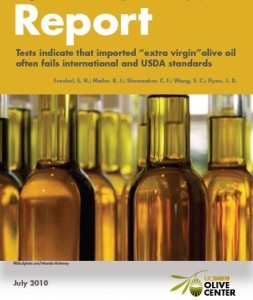Posts Tagged: Dan Flynn
Starting a rEVOOlution
A traditional crop is getting a modern makeover – and UC Davis is cultivating its growth in California.
The UC Davis Olive Center last month hosted a symposium on super-high-density olive production – a relatively new practice that has fueled the expansion of California’s olive oil industry. The production system, developed in Spain, reached the Golden State in 1999 and has taken off in the past five years. California accounts for almost all domestic olive oil production – now 850,000 gallons a year – and is poised to become a global player.
“California could within the next 10 years rank among the top 10 olive oil producers in the world,” said Dan Flynn, executive director of the UC Davis Olive Center.
Traditionally, olives have been planted at about 100 trees per acre and harvested by hand. Super-high-density olives are planted at more than 500 trees per acre and harvested by machine. The method lowers harvesting costs and speeds the turnaround from orchard to mill, a key to freshness and flavor. More than 100 growers attended the sold-out symposium to get the inside scoop – “a great deal of useful information,” Flynn said.
The self-funded UC Davis Olive Center, launched in 2008, is the only academic center of its kind in North America. Collaborating with industry, it published an olive production survey in November. The center made headlines with its just-published study that many premium-priced imported olive oil brands labeled as extra virgin – even those of EVOO queen Rachael Ray – aren’t as pure as they claim (California oils fared better). Upcoming projects could include research on super-high-density yields, costs and compatibility.
With olive oil consumption growing nationally, the climate is right in California, which has about 17,000 acres of super-high-density olives after 4,500 acres were planted in 2009. The most popular regions to grow olives for oil are Glenn and San Joaquin counties, putting Davis at the heart of the movement.
UC Davis has a history of helping to propel California agricultural products to worldwide prominence, such as grapes and wine. “It’s possible that something similar could happen with olives,” Flynn said.

Mechanical harvesting at Corto Olive (Photo by Corto Olive)
Not so 'virgin' olive oil
Buyer beware, is the message of a new study from the UC Davis Olive Center, which found that many of the imported olive oils sold in California retail stores are not “extra virgin” oil as their labels claim they are.
Extra virgin olive oil is the top grade and priciest of olive oils. To meet international standards, extra virgin must be removed from the olive without using heat or solvents. It also has to meet specific criteria for chemical makeup, flavor and aroma.
However in the new study, researchers at UC Davis and in Australia discovered that 69 percent of the imported oils sampled, compared to just 10 percent of the California-produced oils sampled, failed to meet internationally accepted standards for extra virgin olive oil.
The imported oils tested were purchased from supermarkets and “big box” stores in three California regions: Sacramento, the San Francisco Bay Area and Los Angeles County. The California brands, however, were found only in the Sacramento and San Francisco Bay Area.
Defects in those oils that failed to pass muster included oxidation from excessive temperature, light or aging and addition of cheaper refined olive oils. Other flaws may have been linked to improper processing or storage and use of damaged or overripe olives.
The complete report from the study, which is the first of its kind from an American college or university, is available online from the UC Davis Olive Center at: http://olivecenter.ucdavis.edu/.
The study was funded by Corto Olive, California Olive Ranch and the California Olive Oil Council.
Anecdotal reports of low-quality olive oils lurking behind extra-virgin labels have been floating about for some time but this is the first “empirical proof” to support those suspicions, according to Dan Flynn, executive director of the UC Davis Olive Center..
“The intent of the study was to provide consumers and retailers with an accurate picture of the quality of olive oils now being marketed through grocery stores and other retail outlets in California,” said Flynn, noting that the United States is the third-largest consumer of olive oil in the world.
“Our hope is that these findings will lead to improved methods for evaluating extra virgin olive oil, and increased consumer confidence that “extra virgin” on the label means extra virgin in the bottle,” he said.


